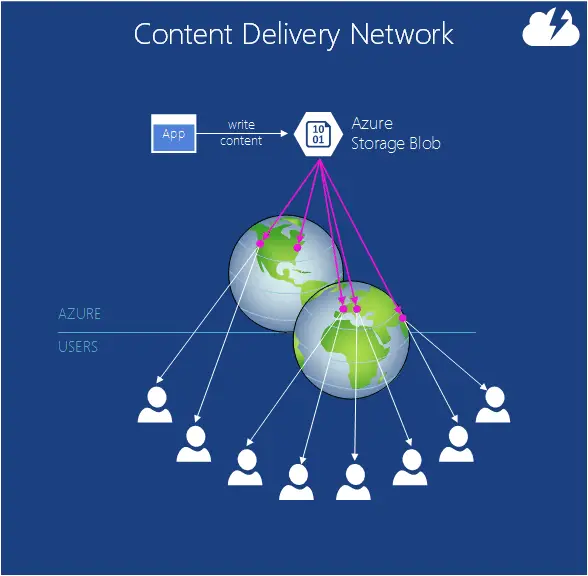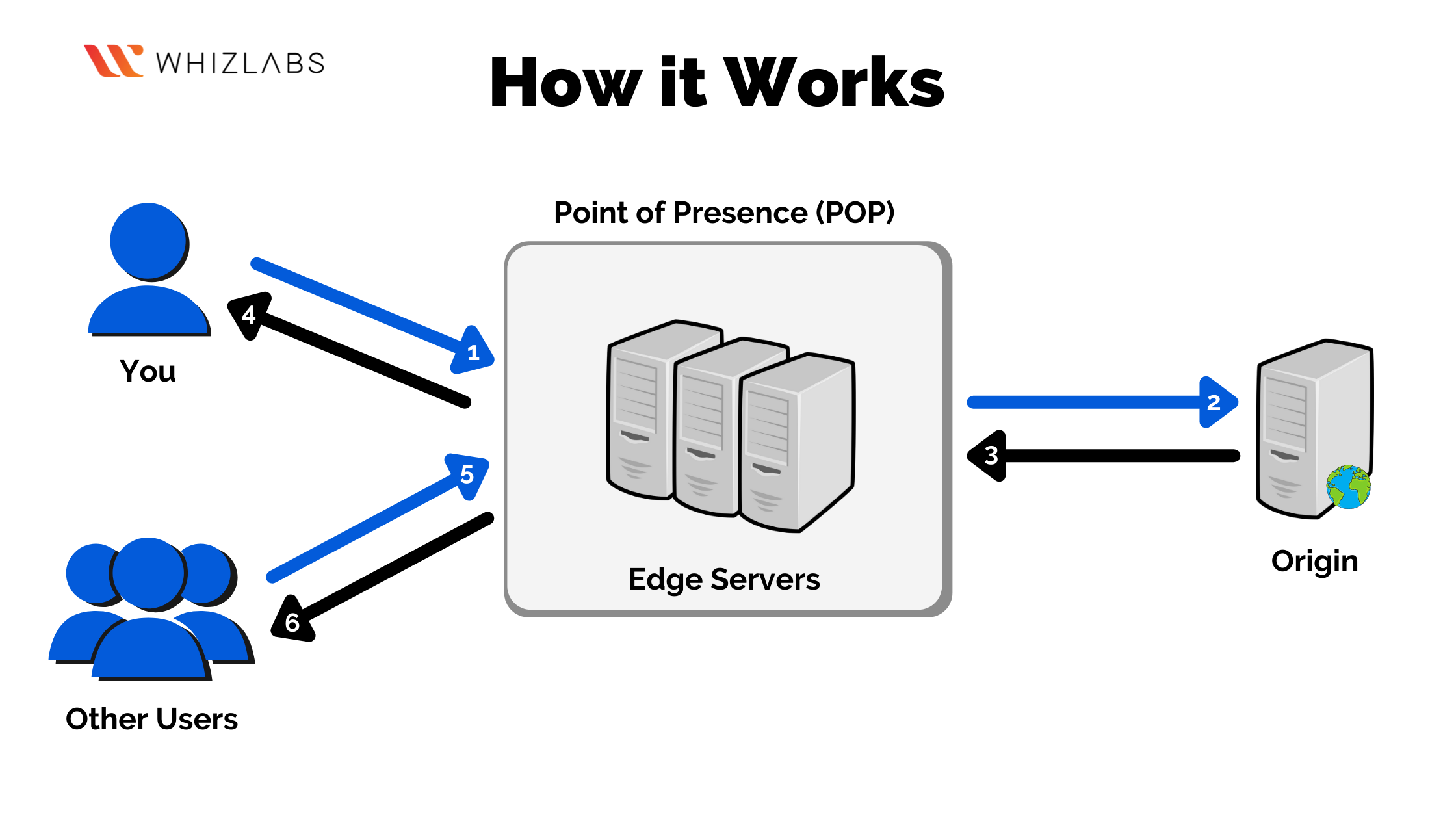Microsoft Azure Content Delivery Network (CDN)

Azure CDN is a global network of distributed edge servers that cache content close to end users, optimizing the delivery of static and dynamic content. By utilizing Azure CDN, you can significantly improve the performance, reliability, and scalability of your applications.

Benefits of Azure CDN

- Enhanced user experience: Faster content delivery reduces page load times, leading to a more responsive and engaging user experience.
- Reduced latency: Edge servers located near users minimize the distance content travels, resulting in lower latency and improved responsiveness.
- Increased scalability: The distributed CDN infrastructure can handle high traffic volumes, ensuring content availability even during peak usage.
- Cost optimization: Azure CDN charges only for the usage and bandwidth consumed, offering a cost-effective way to deliver content.
- Enhanced security: Azure CDN integrates with Azure Security Center to provide end-to-end security and protection against DDoS attacks.
Features of Azure CDN
- Global presence: Azure CDN has over 100 Points of Presence (PoPs) across the globe, ensuring content is cached closest to end users.
- Protocol support: Azure CDN supports various protocols, including HTTP/2, HTTPS, and RTMP, to deliver content over different channels.
- Origin integration: Azure CDN seamlessly integrates with various origins such as Azure Blob Storage, Azure Media Services, and other cloud or on-premises sources.
- Caching policies: Configure caching rules to define how content is cached and delivered, such as cache duration and cache invalidation.
- Reports and analytics: Track CDN usage, performance, and origin responses to optimize content delivery and identify potential issues.
Types of Azure CDN Profiles
Azure CDN offers three types of profiles to cater to different use cases:
- Standard Azure CDN: Ideal for most static content delivery scenarios, providing a cost-optimized solution with a focus on performance.
- Premium Azure CDN: Designed for high-volume, demanding scenarios, offering ultra-low latency, high throughput, and advanced caching capabilities.
- Video Azure CDN: Optimized for video streaming, providing a secure and reliable platform for delivering high-quality video content.
Integration with Azure
Azure CDN integrates seamlessly with Azure services such as:
- Azure App Service
- Azure Storage
- Azure Media Services
- Azure Functions
This integration allows easy configuration and management of CDN delivery from within Azure, simplifying content delivery workflows.
Conclusion
Microsoft Azure CDN is an essential tool for enhancing the performance and scalability of your Azure applications. By leveraging its global network of edge servers, you can deliver content faster, with reduced latency and improved reliability. Azure CDN offers a range of features and integrates seamlessly with Azure services, making it an ideal choice for optimizing your content delivery strategy.# Microsoft Azure CDN: Seamless Content Delivery Within Azure
Executive Summary
Microsoft Azure CDN is a global content delivery network (CDN) that helps you deliver your content to users with high performance and reliability. Azure CDN is integrated with other Azure services, making it easy to set up and manage. With Azure CDN, you can:
- Improve performance: Azure CDN caches your content in edge locations around the world, so users can access your content quickly and reliably, regardless of their location.
- Reduce costs: Azure CDN can help you reduce bandwidth costs by caching your content closer to users.
- Improve security: Azure CDN can help you protect your content from DDoS attacks and other security threats.
Introduction
Content delivery networks (CDNs) are essential for delivering online content with high performance and reliability. A CDN is a distributed network of servers that cache content closer to users, so that content can be delivered quickly and reliably, regardless of the user’s location.
Microsoft Azure CDN is a global CDN that is integrated with other Azure services, making it easy to set up and manage. With Azure CDN, you can:
- Deliver content from anywhere in the world with high performance and reliability.
- Reduce bandwidth costs by caching content closer to users.
- Protect your content from DDoS attacks and other security threats.
FAQs
1. What is Azure CDN?
Azure CDN is a global content delivery network (CDN) that helps you deliver your content to users with high performance and reliability. Azure CDN is integrated with other Azure services, making it easy to set up and manage.
2. What are the benefits of using Azure CDN?
There are many benefits to using Azure CDN, including:
- Improved performance: Azure CDN caches your content in edge locations around the world, so users can access your content quickly and reliably, regardless of their location.
- Reduced costs: Azure CDN can help you reduce bandwidth costs by caching your content closer to users.
- Improved security: Azure CDN can help you protect your content from DDoS attacks and other security threats.
3. How do I get started with Azure CDN?
Getting started with Azure CDN is easy. You can create an Azure CDN profile in the Azure portal. Once you have created a profile, you can add endpoints to your profile. Endpoints are the locations where you want to cache your content.
Top 5 Subtopics
1. Performance
Azure CDN is designed to deliver content with high performance. Azure CDN uses a variety of techniques to improve performance, including:
- Caching: Azure CDN caches your content in edge locations around the world. This means that users can access your content quickly and reliably, regardless of their location.
- Load balancing: Azure CDN uses load balancing to distribute traffic across multiple servers. This helps to ensure that your content is always available, even during peak traffic periods.
- HTTP/2: Azure CDN supports HTTP/2, which is a newer version of HTTP that is faster and more efficient.
2. Security
Azure CDN is designed to protect your content from DDoS attacks and other security threats. Azure CDN uses a variety of security measures to protect your content, including:
- DDoS protection: Azure CDN uses DDoS protection to protect your content from DDoS attacks. DDoS attacks are attempts to overwhelm a website or server with traffic, making it unavailable to legitimate users.
- SSL/TLS encryption: Azure CDN uses SSL/TLS encryption to protect your content from eavesdropping and man-in-the-middle attacks.
- Web application firewall (WAF): Azure CDN uses a WAF to protect your content from web application attacks. Web application attacks are attempts to exploit vulnerabilities in web applications.
3. Cost
Azure CDN is a cost-effective way to deliver your content. Azure CDN pricing is based on the amount of data that you transfer, and there are no upfront costs. You can use the Azure CDN pricing calculator to estimate the cost of using Azure CDN.
4. Scalability
Azure CDN is a scalable solution that can handle large amounts of traffic. Azure CDN can automatically scale up or down to meet the demands of your traffic. This ensures that your content is always available, even during peak traffic periods.
5. Integration
Azure CDN is integrated with other Azure services, making it easy to set up and manage. Azure CDN can be integrated with Azure Storage, Azure Media Services, and Azure Front Door. This integration makes it easy to deliver content from Azure Storage, stream video from Azure Media Services, and route traffic to your applications using Azure Front Door.
Conclusion
Azure CDN is a global content delivery network (CDN) that helps you deliver your content to users with high performance and reliability. Azure CDN is integrated with other Azure services, making it easy to set up and manage. With Azure CDN, you can:
- Improve performance: Azure CDN caches your content in edge locations around the world, so users can access your content quickly and reliably, regardless of their location.
- Reduce costs: Azure CDN can help you reduce bandwidth costs by caching your content closer to users.
- Improve security: Azure CDN can help you protect your content from DDoS attacks and other security threats.
Keyword Tags
- Azure CDN
- Content delivery network
- Performance
- Security
- Cost
- Scalability
- Integration
